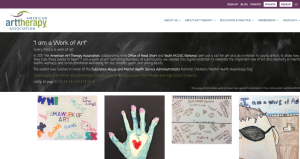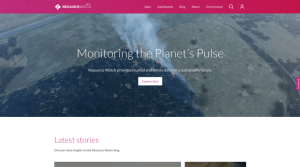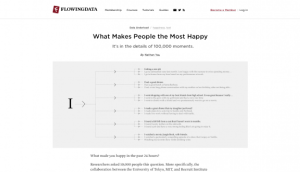Theme: International Happiness Day
Back to Top
|
 |
|
The Positive Lexicography Project
|
Language Arts |
|
Jouissance! Suaimhneas croi! Mechaye! Bazodee! Around the world, there are many ways to express joy, as The Positive Lexicography Project reminds us. This database curates "an evolving index of untranslatable words related to wellbeing from across the world's languages." Words can be explored by theme (such as Relationships, Feelings, or Character) or by Languages (with over 100 included). Each word in the database is color-coded by linguistic origin and includes a brief definition, helping users expand their vocabulary and worldview. For example, under Aesthetics, a subcategory of Feelings, visitors may discover "leggiadria," an Italian word for "loveliness," and "iki," a Japanese word for the principle of "simplicity." Or, under Love, a subcategory of Relationships, readers can delve into expressions of affection, from the Greek "storge" ("care and affection," between family members) to Arabic "ishq" ("true, all-consuming love,"). Select words also link out to other dictionaries and resources. By clicking the "Submit a word" box in the upper right-hand corner, users also have the option of filling out an online form to add their own contributions to the list. The project was researched by positive psychology lecturer Tim Lomas, designed by graphic designer Joana Patrasc, and developed by interface engineer Maynard Russell. [EMB] |
|





|
|
 |
|
2019 World Happiness Report
|
Social studies |
|
Now on its seventh edition, the World Happiness Report offers "a landmark survey of the state of global happiness." The 2019 report, edited by John F. Helliwell (Vancouver School of Economics), Richard Layard (London School of Economics), and Jeffrey D. Sachs (Columbia University), centers on "how happiness has been changing over the past dozen years, and how information technology, governance, and social norms influence communities." The Report explores these themes through seven chapters, respectively titled: Happiness and Community: An Overview, Changing World Happiness, Happiness and Voting Behaviour, Happiness and Prosocial Behavior: An Evaluation of Evidence, The Sad State of US Happiness and the Role of Digital Media, Big Data and Well-Being, and Addiction and Unhappiness in America. Readers have the option of downloading the full 136-page report in PDF form or exploring individual chapters (by clicking "Explore the Report" and then navigating the chapter hyperlinks on the right-hand side of the webpage). Readers can also explore the previous six World Happiness Reports under Read the Reports. The FAQ page includes additional content about the report's creation, such as how the data was calculated and how benchmarks were set. Finally, the News page may be of interest to readers looking for the latest stories on global happiness. The World Happiness Report is a collaboration between the United Nations Sustainable Development Solutions Network and the Ernesto Illy Foundation. [EMB] |
|





|
|
 |
|
I am a Work of Art
|
Health |
|
I am a Work of Art is both the title of this resource and the prompt given to young artists tasked with creating a piece reflective of the sentiment. As a result, the American Art Therapy Association curated a digital collection of hundreds of pieces, ranging in form from paintings to sculptures, that all demonstrate "the important role of art and creativity in mental health, wellness, and social-emotional well-being." Readers can view the collection in its entirety, or sort the pieces by age level by clicking the respective links under the introductory paragraph at the top of the page. The content is sorted into two groups: pre-K and elementary student submissions and middle and high school student submissions. While the collection was created in 2017, readers who are interested in further exploring a link between art and well-being may enjoy other resources on the site, such as the Story Library or Art Therapy in Action video series, both found under the About Art Therapy tab. The American Art Therapy Association is a nonprofit organization for art therapists, a profession that seeks enrichment through "art-making, creative process, applied psychological theory, and human experience." [EMB] |
|





|
|
 |
|
The Science of Happiness
|
Health |
|
"What makes [you] happy?" When asked this question, interviewees on The Science of Happiness podcast gave varied answers, including "sunny days, no stress, music, and community." This question is one of many explored through the podcast, which is produced by Public Radio International and the Greater Good Science Center at UC Berkeley. The podcast is on a mission to help listeners "learn research-tested strategies for a happier, more meaningful life, drawing on the science of compassion, gratitude, mindfulness, and awe." Hosted by Dacher Keltner, a renowned psychology professor, episodes include conversations, experiments, and special guests that help listeners understand and cultivate happiness in their lives. Topics covered range from "How To" guides such as "How To Be Less Hard on Yourself" (Episode 54) to guests sharing advice on "awkward relationships" (Episode 27) and "express[ing] gratitude" (Episode 32). Since the inaugural episode in February 2018, the series has grown to 5 seasons and over 50 episodes. These episodes are around 20 minutes in length, making it a perfect listen for a short commute. Listeners can find all of the episodes on podcast platforms such as Apple Podcasts and Google Play, or via this link, where they can also read the full transcripts. [EMB] |
|





|
|
 |
|
Action for Happiness
|
Health |
|
As the Dalai Lama proclaims, "happiness is not something ready made. It comes from your own actions." Learn about actions you can take to amplify happiness on the aptly named resource, Action for Happiness. The resource "bring[s] together like-minded people from all walks of life and help[s] them take practical action, drawing on the latest scientific research?from diverse fields including psychology, education, economics, and social innovation." On the Actions page, readers can browse over 50 of these action items, from long-term goals such as "Find your true purpose," to short-term events like "Organise a party in your street." After clicking on an action item, readers will find additional content such as a rationale for that action, steps to success, and a resource list. Those looking for guidance on small "daily actions" they can take may want to download a monthly "Action Calendar" from the Calendars page. On the 10 Keys page, readers can explore the acronym "GREAT DREAM," used to represent "ten keys to happier living:" Giving, Relating, Exercising, Awareness, Trying Out, Direction, Resilience, Emotions, Acceptance, and Meaning. Readers looking for in-person resources may want to explore the Course, Events, and Cafes pages, while educators should check out classroom resources on the School page. Finally, tech-savvy readers can download Action for Happiness's app, with personalized daily content. Of note, the app is designed for UK time zones and may not be as effective elsewhere. [EMB] |
|





|
|

















